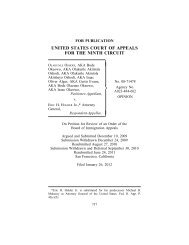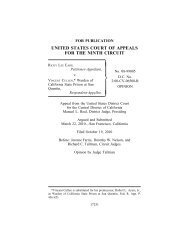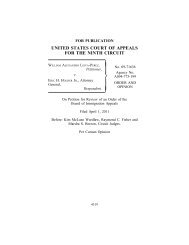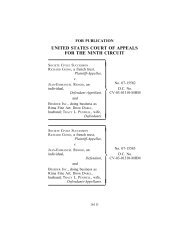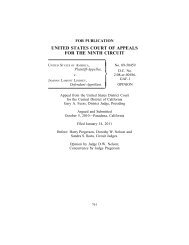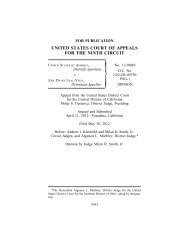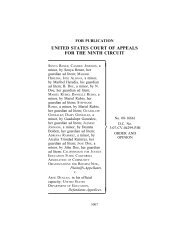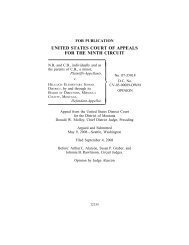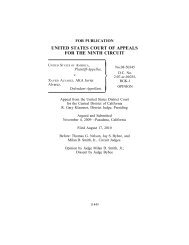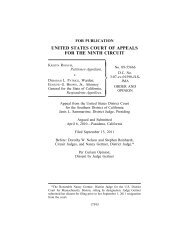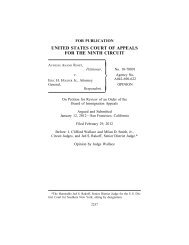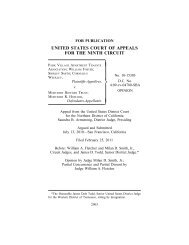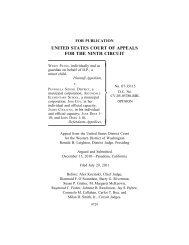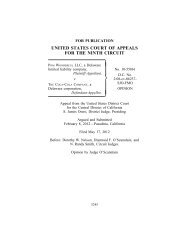this opinion - Court of Appeals - 9th Circuit - U.S. Courts
this opinion - Court of Appeals - 9th Circuit - U.S. Courts
this opinion - Court of Appeals - 9th Circuit - U.S. Courts
Create successful ePaper yourself
Turn your PDF publications into a flip-book with our unique Google optimized e-Paper software.
FIC v. UNION PACIFIC RAILROAD<br />
9471<br />
ment in its filings in the district court or its initial briefs on<br />
appeal. 3<br />
We consider arguments raised for the first time on appeal<br />
only in “exceptional circumstances.” AlohaCare v. Haw.<br />
Dep’t <strong>of</strong> Human Servs., 572 F.3d 740, 744-45 (<strong>9th</strong> Cir. 2009)<br />
(quotation marks omitted). FIC suggests two exceptional circumstances<br />
exist here: (1) Kawasaki was a “change in law<br />
rais[ing] a new issue while [the] appeal [was] pending,” id. at<br />
744-45 (quoting Kimes v. Stone, 84 F.3d 1121, 1126 (<strong>9th</strong> Cir.<br />
1996) (internal quotation marks omitted); (2) the issue is<br />
“purely one <strong>of</strong> law,” id. (same). With respect to the first circumstance,<br />
there was no relevant change in the law. FIC<br />
“could easily have made” its Harter Act argument before the<br />
Supreme <strong>Court</strong> issued Kawasaki. Turnacliff, 546 F.3d at<br />
1120. The Harter Act argument is, however, a purely legal<br />
issue; that is, it “ ‘does not affect or rely upon the factual<br />
record developed by the parties, and will not prejudice the<br />
party against whom it is raised.’ ” Dream Palace v. Cnty. <strong>of</strong><br />
cargo.” N. River Ins. Co. v. Fed Sea/Fed Pac Line, 647 F.2d 985, 987 (<strong>9th</strong><br />
Cir. 1981). But, “[t]o the extent that the Harter Act governed international<br />
trade leaving from or entering American ports, it was superseded in 1936<br />
by the Carriage <strong>of</strong> Goods by Sea Act [(COGSA)], 46 U.S.C. [§ 30701<br />
note].” Id. FIC argues that the Harter Act applies because the damage<br />
occurred after the goods were discharged from the vessel and COGSA<br />
does not apply by its own force at that point. See id. at 987 n.3 (citing Isthmian<br />
Steamship Co. v. Cal. Spray Chem. Corp., 300 F.2d 41, 46 (<strong>9th</strong> Cir.<br />
1962) (COGSA notwithstanding, “[t]he Harter Act was preserved for . . .<br />
the time prior to loading and after delivery.” (citation omitted)).<br />
3 FIC also argues that the common law would prohibit the covenant not<br />
to sue. The Harter Act largely codified the common law, see United States<br />
v. Atlantic Mut. Ins. Co., 343 U.S. 236, 239-40 (1952), and FIC has not<br />
identified a material difference between the two in <strong>this</strong> case, so we treat<br />
the claims as one. FIC further argues that it can claim damages under UP’s<br />
Master Intermodal Transportation Agreement, a bill <strong>of</strong> lading issued by<br />
UP. FIC concedes remand would be required to develop the factual record<br />
before analyzing <strong>this</strong> claim, so it is waived. See Turnacliff v. Westly, 546<br />
F.3d 1113, 1120 (<strong>9th</strong> Cir. 2008).



